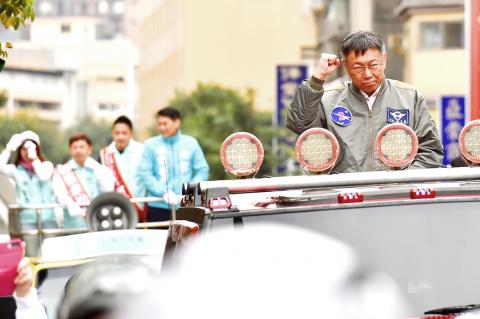The Taiwan People’s Party (TPP) yesterday vowed to become the nation’s largest party at the launch of its nationwide motorcade campaign for the Jan. 11 legislative elections.
Taipei Mayor Ko Wen-je (柯文哲), who is also TPP chairman, told a news conference at the Taiwan New Cultural Movement Memorial Museum in Taipei that the party would not settle for being the third-largest, but would set its sights on becoming the largest party that shapes Taiwan’s politics.
Holding an event at the museum was inspiring, as the museum documents the desire of Taiwanese in the 1920s and 1930s to pursue democracy and freedom, and keep up with the world’s most advanced civilizations, he said.

Photo: Tu Chien-jung, Taipei Times
The New Cultural Movement, whose credo was to embrace progressive values, was a manifestation of Taiwanese desire to change the “status quo,” he said.
“Change starts with the capital and culture” was his campaign slogan for the 2014 Taipei mayoral election, which was the first campaign in Taiwan’s history that appealed to changing the nation’s culture, Ko said, adding that to him, elections and ruling a nation are both social movements aimed at reforming political culture.
The TPP would unite people to move the nation forward, giving people a new option other than the pan-green and pan-blue camps, he said.
Although Taiwanese democracy has had its achievements over the past three decades, after three transitions of political power the nation has been beleaguered with the question of “unification or independence,” and the government rules with ideologies, which has stalled and hindered the nation, Ko said.
Someone once asked him what his principle of governance was, to which he replied: “Do the right thing, and do it conscientiously; do not do the wrong things,” Ko said, adding that this, coupled with persistence, practicality, science and statistics, would move the nation forward.
Ultimately, politics is about executive power, and politicians not only need to identify problems and troublemakers, they also need to be able to solve issues, he said.
Next year would mark the TPP’s first battle for legislative seats, a battle for which the party would fight by touting its values of governance and financial discipline, as well as an open and transparent government, he added.

Taiwan is to commence mass production of the Tien Kung (天弓, “Sky Bow”) III, IV and V missiles by the second quarter of this year if the legislature approves the government’s NT$1.25 trillion (US$39.78 billion) special defense budget, an official said yesterday. Commenting on condition of anonymity, a defense official with knowledge of the matter said that the advanced systems are expected to provide crucial capabilities against ballistic and cruise missiles for the proposed “T-Dome,” an advanced, multi-layered air defense network. The Tien Kung III is an air defense missile with a maximum interception altitude of 35km. The Tien Kung IV and V

The disruption of 941 flights in and out of Taiwan due to China’s large-scale military exercises was no accident, but rather the result of a “quasi-blockade” used to simulate creating the air and sea routes needed for an amphibious landing, a military expert said. The disruptions occurred on Tuesday and lasted about 10 hours as China conducted live-fire drills in the Taiwan Strait. The Civil Aviation Administration (CAA) said the exercises affected 857 international flights and 84 domestic flights, affecting more than 100,000 travelers. Su Tzu-yun (蘇紫雲), a research fellow at the government-sponsored Institute for National Defense and Security Research, said the air

Taiwan lacks effective and cost-efficient armaments to intercept rockets, making the planned “T-Dome” interception system necessary, two experts said on Tuesday. The concerns were raised after China’s military fired two waves of rockets during live-fire drills around Taiwan on Tuesday, part of two-day exercises code-named “Justice Mission 2025.” The first wave involved 17 rockets launched at 9am from Pingtan in China’s Fujian Province, according to Lieutenant General Hsieh Jih-sheng (謝日升) of the Office of the Deputy Chief of the General Staff for Intelligence at the Ministry of National Defense. Those rockets landed 70 nautical miles (129.6km) northeast of Keelung without flying over Taiwan,

A strong continental cold air mass is to bring pollutants to Taiwan from tomorrow, the Ministry of Environment said today, as it issued an “orange” air quality alert for most of the country. All of Taiwan except for Hualien and Taitung counties is to be under an “orange” air quality alert tomorrow, indicating air quality that is unhealthy for sensitive groups. In China, areas from Shandong to Shanghai have been enveloped in haze since Saturday, the ministry said in a news release. Yesterday, hourly concentrations of PM2.5 in these areas ranged from 65 to 160 micrograms per cubic meter (mg/m³), and pollutants were